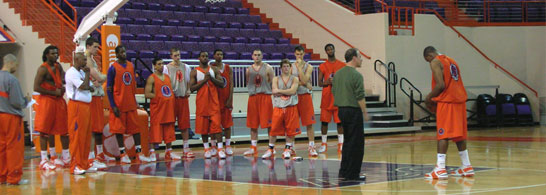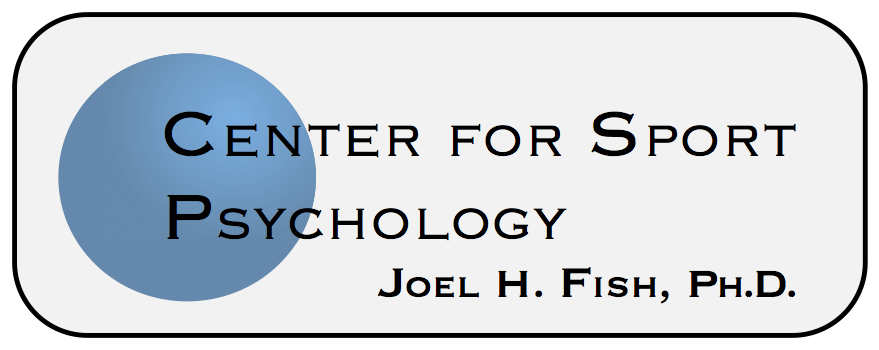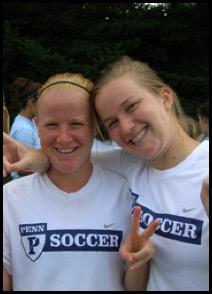General Student, Student Support & Administrator Presentations

The following General student, Student Support, and Administrator presentations are currently offered by the Center for Sport Psychology
Who Is Today's Student?
"Why can’t they be more like we were?" Students today are different than they were 10, 20, 30 and 40 years ago. We can either be angry with today's student-athletes or learn to work better with them. Learn the latest information on male and female student’s attitudes about winning, losing, success, failure, competition, and off-the-field behavior choices. In addition, learn the strategies to more effectively teach and communicate with today’s student-athletes.
Psychology of Winning On
and Off the Playing Field
There are common mental skills necessary to be successfully on the athletic field, in the class room, and in one's personal life off of the field. This presentation focuses on practical skills related to improving self confidence, focus, communication, good judgment, positive decision making, and teamwork, both on and off the playing field.
Reducing Risky Student Behavior
Being a college student is not all fun and games. Innovative strategies and programming ideas will be offered to help respond to the unique pressures on students, including: the freshmen experience, gender issues, substance abuse, eating disorders, gambling, sexual misconduct and relationship violence. In addition, learn to identify positive methods for stress management, celebration, communication, and teamwork
Stress Management
Stress is part of the life of every student athlete, student support staff member, and athletic administrator. Learn about healthy and unhealthy competition. In addition, strategies will be offered to help manage stress, overcome competitive anxiety, relax under pressure, and celebrate in a healthy way. Academic, social, and sport examples will be discussed.
Identifying High Risk College Student Athletes
With college-age students, what you see isn’t always what you get. There are signals, however, that can be picked up to help identify high-risk students. During this presentation, we will discuss early warning signs for depression, anxiety disorders, social adjustment disorders, relationship violence, sexual misconduct, gambling, substance abuse, and eating disorders. Intervention strategies for working with high-risk college individuals and groups will also be discussed.
Embracing Diversity and Respecting Individual Differences
When we understand the stereotypes we have of others, we are in a better position to overcome those stereotypes. This presentation helps individuals to identify their attitudes about themselves and others, and offers ways to respect individual differences as well as to work better together.
Hazing & Initiations
Is it a good-natured joke? Or abuse? Is it a continuation of tradition? Or is it a criminal act? There is evidence that hazing and initiations remain a significant problem on many college campuses. This presentation will help define where tradition stops and abuse begins. In addition, learn effective programming strategies to reduce harmful rituals as well as develop more constructive teambuilding traditions.
Athletes and Mental Health Issues
Athletes experience the same feelings and thoughts as non-athletes.
Learn the signs and symptoms of athletes who are experiencing anxiety, stress, depression, relationship issues and other mental health issues. Also learn ways to communicate with teammates and coaches in order to best address athlete mental health issues.
Secrets To Being An Effective Team Leader
There is evidence that team leaders rate their athletic experience as less enjoyable than non-team leaders. The key to improve team leader effectiveness is to teach them the skills necessary to play this important role. This presentation identifies key issues for team leaders and teaches skills in the areas of conflict resolution with teammates, communicating with coaches, and motivating different personality types.
Sportsmanship & Ethical Behavior
There is more cheating and poor sportsmanship in college sports than ever before. This presentation will identify the reasons for the lack of sportsmanship and ethical behavior in sports today. In addition, specific ways will be offered to promote fair play, positive sportsmanship, healthy competition, and ethical behavior in college athletics.
Conflict Resolution
Disagreements can either escalate or be defined. Negotiation, compromise, and mediation are proven strategies to help reduce conflicts. Applications to our personal and professional lives will be discussed.
Gaining the Mental Edge
In order to achieve peak performance, we need to develop certain mental skills. This presentation offers a model to teach skills in the areas of Self-Confidence, Temper Control and Teamwork, Positive Attitude and Respect. There will be a demonstration of the "S.T.A.R. System" to a variety of academic, social, and performance situations.
Sexuality & Today’s Athletes
There has been an increase in incidents on college campuses related to students and sexual misconduct. This presentation will help to identify the reasons for sexually inappropriate behavior as well as provide a model to educate students on healthy sexuality and relationships.
Jocks, Greeks, Booze, and Violence
Students, fraternities, and sororities have a reputation for substance abuse and disruptive behavior. This presentation will address the myths and facts about these groups as far as their vulnerability to substance abuse and violence. Effective prevention and intervention strategies in working with these groups will be identified.
More Presentations



